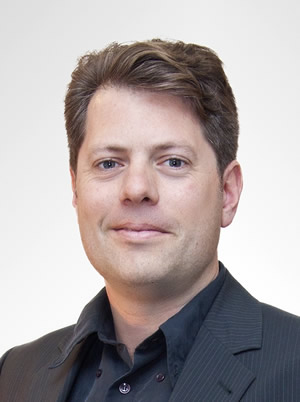Professor Daniel WilsonBy Dr. Prakash Kharel  Dr. Daniel Wilson is a professor of Biochemistry at the Institute for Biochemistry and Molecular Biology, University of Hamburg, Germany. Wilson group uses a combination of structural and molecular biology tools to provide insight into the fundamental process of protein synthesis as well as providing a mechanistic basis upon which to develop new and improved antimicrobial agents. Currently, his lab also studies ribosome quality control (RQC) in bacteria and eukaryotes. In bacteria, they were excited to see how protein synthesis and tRNA translocation-like movements can occur on the large subunit independent of the small subunit, mRNA, and the translocase EF-G. In the eukaryotic RQC project, Dr. Wilson’s team has been exploring the connection between the amino acid stress response sensed by GCN1 and ribosome collisions, which implies possible links to general RQC pathways in eukaryotes. Dr. Wilson’s path to a career in academia was not straightforward. After finishing his Ph.D. in New Zealand, one of his external Ph.D. examiners, Prof. Knud H. Nierhaus invited him to do a post-doc in Germany—and he was intrigued. Dr. Wilson had actually visited Nierhaus lab in Berlin during his Ph.D. and had been excited by the lab’s science and his exciting discussions with Nierhaus lab and the neighboring labs of Prof. Richard Brimecombe and Dr. Francois Franceschi. After completing his Ph.D., Dr. Wilson decided to join the Nierhaus lab and applied for the Alexander von Humboldt Foundation fellowship. However, rather than waiting for the outcome, he headed off to London, just not for research. Initially, Dr. Wilson found a job as a truck driver for a catering company: “I had convinced my boss that all New Zealanders can drive trucks (it’s a farming country!) and because I was born in London, I knew it like the back of my hand (I left the UK for NZ when I was three years old). With a lot of help from the ‘London A-Z’, I can say that I now know London and all its narrow one-way streets.” However, Dr. Wilson soon found the catering job didn’t provide the cash needed to survive in London. “So I took up a position as a regional manager for a biotech firm, called ‘Biogene,’” he continued. “They had the license to sell qPCR machines, which was becoming fashionable, and having a company car, computer, and cash made life more comfortable. At some point, Roche took over the license for the qPCR machine and renamed it the ‘LightCycler’. They poached most of the sales representatives too. I remember vividly the day the contract from Roche arrived in the post. It was also the day that the email arrived from the Alexander von Humboldt foundation, offering me a scholarship in Germany. I think it is clear which path I took…Thus, illustrating that it is possible to come back from industry to academia…and I certainly don’t regret it!” Although Dr. Wilson was fascinated by the ribosome and translation regulation during his Ph.D., it was the reports of crystal structures of ribosomal particles in 2000 and subsequent developments in cryo-EM that drew (and then kept him) in this field. Later on, while he was a junior group leader, a member of the institute’s scientific advisory board questioned why Dr. Wilson was still working on ribosomes “since it had all been done” and suggested he should be working on some other ncRNAs. 10 years later, Dr. Wilson and his team are still uncovering completely new regulatory pathways that are revolving around the ribosome and translation. Dr. Wilson doesn’t expect that this will change in the next 10 years either.
When asked about his key advice for trainees, he said, “It is important to be very particular about the details of the experimental planning (with controls!). But at the same time, it is also important to not get lost too much in details of your research – to take a step back and see the overall picture and define what the important questions are. We are continuously re-assessing where we are in projects and re-prioritizing the importance of different facets and research directions.” He added, “Know the literature! Read, Read, Read – and ideally do this before you start the experiments! I have to confess that this is becoming harder and harder these days with so many other commitments and seemingly more and more relevant papers coming out. But that is exactly why it is even more important to keep on top of the state-of-the-art in your and related fields”. Dr. Wilson said the greatest challenge he had encountered has been “learning the German language!” He explained, “At German Universities, a lot of administration and teaching requires Deutsch. Therefore, some modicum of understanding and speaking Deutsch is essential. However, I cannot say that I have overcome this challenge; instead, I see it as a life-long hurdle. It is also humbling to see my kids learn it effortlessly and overtake me within a few years. I am ready for the next stage, when they start criticizing my strange accent!” Dr. Wilson’s favorite RNA is the rRNA for obvious reasons, but he has a controversial perspective on color schemes: “It was recently commented on twitter that we were not conforming to the classical colors for the ribosomal subunits i.e. yellow for the small subunit, blue for the large. We had used grey instead of the blue with the rationale that blue stands out better on a grey background, so making the antibiotic blue and the rRNA grey would help the reader. Or as @BeckmannLab put simply, “#GreyIsTheNewBlue.” I hope to see support from RNA Society members for ribosome color diversity in future publications…the more radical the better I say!” For more ribosome takes, you can follow the Wilson Lab on twitter @WilsonLab2. |
